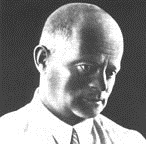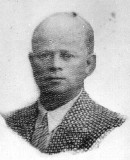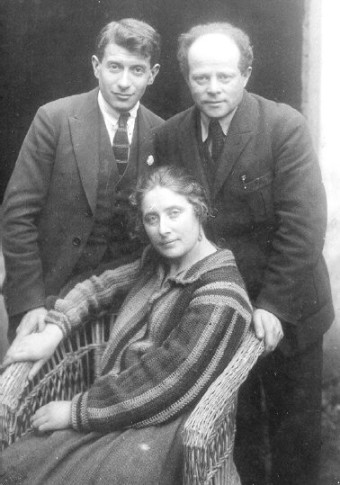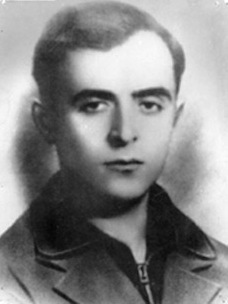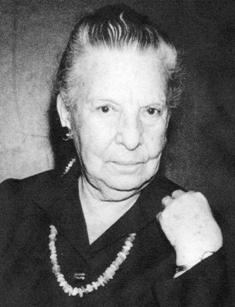Holocaust Education & Archive Research Team |
|
Survivor Stories
Holocaust Survivors Chelmno Survivors Righteous Gentiles Holocaust Recalled
| ||||
Yitzhak Katzenelson Jewish Poet, Playwright and Educator
Yitzhak Katzenelson was born on 21 July 1886, in Karelitz, now Korelichi, near the Belorussian capital of Minsk, as the son of Hinda Katzenelson and Jakob Benjamin Katzenelson, who was a writer and a teacher. Soon after his birth, the Katzenelson family moved to Lodz, where Yitzhak was considered a literary prodigy. By the age of twelve, he already had written his first play, Dreyfus un Esterhazy, which he performed with other young people in his own backyard.
As an adult, he first became known for his Hebrew textbooks and books for children, which were the first of their kind. He also wrote Yiddish comedies, which he translated into Hebrew. His first volume of poetry, Dimdumim (Hebrew for twilight). Appeared in 1910, and two years later Katzenelson founded the theatre Habima Halvrit (The Hebrew Stage) and a Hebrew school in Lodz. He also contributed to the development of modern Hebrew through his work as a translator. He translated works by Shakespeare and Heine, among others, into Hebrew.
Several of his Yiddish plays were performed in Lodz even before the First World War, and he took it on tours of cities in Poland and Lithuania. Before the First World War Katzenelson undertook the creation of a network of Hebrew schools in Lodz, from kindergarten to high school, which functioned until 1939. He was the author of textbooks, biblical plays, and children’s books.
Beginning in 1930 he belonged to the Dror movement in Lodz and to the He- Haluts movement, the latter operating a training kibbutz- Kibbutz Hakhsharah in Lodz. Katzenelson’s work in the interwar period was based on his sense that Jewish life in the Diaspora was incomplete; this belief also motivated his participation in cultural and other public affairs in those years. Such feelings appear in his works in the form of sombre symbols of death, boredom, and silence.In his Yiddish play Tarshish, Katzenelson deals with the roots of anti-Semitism in Poland and with the utter hopelessness of Jewish life on Polish soil.
The German blitzkrieg against Poland began on 1September 1939, and eight days later Lodz, then home to some 250,000 Jews, was occupied by the Germans. Like many other Jewish institutions, Katzenelson’s school was closed; it later served as Gestapo headquarters.
At the urging of his family, Katzenelson fled in late November 1939 to Warsaw, his wife Hanna and their three children followed him there. In the Warsaw Ghetto Katzenelson worked in the underground as a teacher of religion and Hebrew and published under various pseudonyms , poems, short plays and articles in the underground newspaper of the socialist Zionist organisation Dror (freedom in Hebrew). Many of his works dealt with current events, while others had Biblical or historical settings and served as a transparent reflection of what was occurring at the time.
Katzenelson wrote poems about hunger and cold, which were intended not as works of art, but as a vivid expression of suffering, his images were a realistic expression in reaction to the desolate circumstances. The time in the Warsaw Ghetto was Katzenelson’s most creative period. In the ghetto he wrote approximately fifty plays, epics in verse and poems.
In the nineteen months of the Nazi occupation of Warsaw, Katzenelson attempted to strengthen the ghetto inhabitants will to live, by interpreting everyday events in relation to Jewish history. His plays were performed in the orphanages of Korczak and Dombrowski, and weekly readings were held in the Dror commune at 34 Dzielna Street. With the help of a mimeograph machine, Dror published Katzeelson’s Yiddish play Iyov (Job) in the Warsaw Ghetto on 22 June 1941 – it was the only Jewish book published by Jews during the German occupation.
On 22 July 1942, the Germans commenced the long dreaded mass deportation of the Jews of Warsaw to the death camp at Treblinka, within the space of a few weeks a large percentage of the inhabitants of the Warsaw Ghetto had been murdered there. Katzenelson’s wife Hanna, and his two younger sons Benjamin and Ben Zion were deported to Treblinka death camp on 14 August 1942, where all three perished. At the time of the mass deportation “aktion, “ Katzenelson worked in the Hallmann workshops.
Two days before the beginning of the mass deportations, Mordechai Tennenbaum, one of the leading members of Dror He-Halutz and one of the influential figures in founding the Jewish Fighting Organisation (ZOB) concealed some of Katzenelson’s writings, along with the Dror archives, in an underground hiding place, some of which survived, and is now in Israel. Katzenelson and his oldest son, Zvi, were smuggled into the Fritz Schulz workshop and thus protected from deportation.
On 18 January 1943 the Nazis attempted the “Second Aktion” to deport the so-called illegal Jews who were not employed in German owned factories, which led to the Jewish underground resistance and the Germans broke off the deportation after only four days.
Heinrich Himmler the Reichsfuhrer-SS ordered the SSPF (SS Police Leader) of Warsaw District von Sammern to liquidate the ghetto by 14 February 1943. On 19 April 1943 the Germans started the “Grosaktion” to finally liquidate the Warsaw ghetto, the Jews revolted and turned back the German forces, and thus began a revolt that lasted twenty –seven days. One day after the start of the revolt Katzenelson and his oldest son Zvi were smuggled out of a ghetto bunker at 50 Leszno Street into the “Aryan” part of the city.
Itzhak Katzenelson and his son Zvi went to the Polski Hotel along with many other Jews who held foreign passports/ documentation, Katzenelson and his son procured documents from Katzenelson’s friend Daniel Guzik, certifying their citizenship of Honduras, and they left the Hotel Polski to the French internment camp at Vittel
On 3 October 1943, two days after Rosh Hashanah, the Jewish New Year, Katzenelson started writing his most famous work Dos Lid funem Oysgehargen Yidishn Folk (The Song of the Murdered Jewish People). On 18 January 1944 he completed his epic work and he then concentrated on making corrections and copies.
Two months after its completion all the Jews interned in the Vittel Camp were declared stateless, and on 18 April 1944, all the one hundred and seventy three Polish Jews were transported in three railroad cars to the Drancy Transit Camp near Paris.
Itzhak Katzenelson and his son Zvi were deported on the seventy-second RSHA transport from France which arrived at the Birkenau ramp on 1 May 199. This transport contained 1,004 Jewish men, women and children. 865 Jews were murdered in the gas chambers, probably including Yitzhak and Zvi Katzenelson.
In the spring of 1944 shortly after Katzenelson had completed his epic, Ruth Adler, a German Jew from Dresden who had a British Palestinian passport, received permission to leave the country in an exchange for German Prisoners of War. In the leather handle of her suitcase, she smuggled out one of the two copies out of the Vittel Camp and went to Israel.
The other copy was buried by Katzenelson with the help of fellow internee, Miriam Novitch – in three sealed glass bottles under a tree in the Vittel Camp. After the camps liberation Miriam Novitch retrieved the manuscript as well as other writings by Katzenelson.
His epic poem was first published in May 1945, barely a year after his death and the Ghetto Fighters House in Israel is named after Itzhak Katzenelson and the museum has made extensive efforts to collect his manuscripts and to translate his works into English and other languages. Katzenelson’s Vittel Diary was published in English in 1964.
Note: Although Yitzhak Katzenelson perished during the Holocaust the sprit of his poems has survived. We have decided to add his story to the Holocaust survivors section out of respect for his surviving works. - H.E.A.R.T
Source:
Encyclopedia of the Holocaust Holocaust Historical Society Yitzhak Katzenelson – The Poet of Destruction by Julian Voloj – AJDC Paris 2005 The Jews of Warsaw by Yisrael Gutman published by the Harvester Press Brighton 1982 The Warsaw Ghetto – A Guide to the Perished City by Barbara Engelking and Jacek Leociak published by Yale University Press 2009 Auschwitz Chronicle by Danuta Czech published by Henry Holt and Company New York 1989 The Song of the Murdered Jewish People by Itzhak Katzenelson; translated by Noah H. Rosenbloom Ghetto Fighters House – Israel Warsaw Ghetto Database
Copyright. Irene Seymour with assistance from Chris Webb H.E.A.R.T 2012
|
